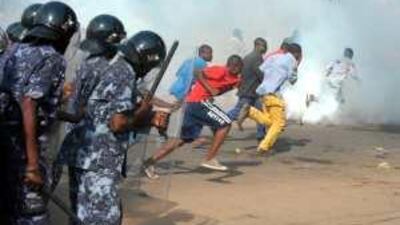NAIROBI // Supporters of the opposition party in Togo took to the streets yesterday and throughout the past week to demonstrate their outrage over the country's presidential election results, which they say were rigged. Not surprisingly, the ruling party called in the police to quell the protest with tear gas and batons. Faure Gnassingbé, the president, claimed victory after officials announced he had won 60 per cent of the vote in the tiny West African country. Mr Gnassingbé took power after his father, Gnassingbé Eyadéma, died in 2005 after ruling since 1967.
Africa analysts were not surprised with the election result or the violent aftermath. It has become all too common for the ruling party in most African countries to cling to power, usually by force or the threat of it. And, like the formulaic plot of a predictable movie, the opposition usually cries foul, launches a bloody protest and is eventually beaten into submission. With 53 countries spread across a vast continent, there is almost always an election about to take place or just concluded somewhere in Africa. From steamy, one-party West African backwaters to mineral-rich, rainforested kleptocracies to stable southern African democracies, the politics of Africa are as diverse as the continent's geography.
But there is one constant that observers of the continent can almost always count on: whenever there is an election in Africa, things will probably go pear-shaped. History shows why Africa has such a hard time staging peaceful transitions of power. Most African "democracies" are barely 50 years old, having thrown off the shackles of colonisation just a generation ago. African political scientists argue that democracy on the continent needs more time to develop to resemble that of the West.
Looking further in history to pre-colonial Africa explains why many African leaders are reluctant to give up power. Before European powers divided the continent into colonies, Africa was a hodgepodge of kingdoms based mostly along tribal lines. Chiefs were entitled to all the riches of the kingdom and ruled for life or until a more powerful adversary could overthrow them. This mentality still persists today and explains the so-called "African Big Man" syndrome whereby leaders loot the state's resources, entitle their cronies and tribesmen and cling to power - often for life.
The Economist Intelligence Unit's index of democracy, which ranks all the countries of the world by how democratic they are, gives Africa a dismal rating. With the exception of South Africa, Cape Verde and Botswana (numbers 31, 34 and 39 on the list), most African nations rank in the bottom half. Twenty-nine countries are in the bottom third. Likewise, the 2010 Freedom in the World report from Freedom House, a Washington-based think tank, says 19 per cent of African countries are free, the lowest region in the world. The organisation bases its survey on political and civil liberties, including free elections.
Most elections in Africa are hardly free or at least are perceived to be unfair. In Kenya's flawed election in late 2007, Mwai Kibaki, the president, claimed victory, sparking opposition protests that nearly degenerated into civil war. More than 1,300 people died in clashes that quickly became tribal. A few months later, more Zimbabweans voted for Morgan Tsvangirai than Robert Mugabe, but not enough for a clear majority and the presidential poll went to a runoff. Mugabe supporters harassed and intimidated the opposition and Mr Tsvangirai withdrew before the second round, citing security concerns.
Kenya and Zimbabwe both formed unity governments to solve their political crises, but those coalitions have fractured and analysts warn there could be more violence after upcoming elections. There is also potential for violence after the elections in Sudan and Burundi this year. Both countries are holding their first presidential elections since crippling civil wars. Ethiopia also votes this year, its first poll since 200 died in post-election violence after the general election in 2005.
Some countries, such as Equatorial Guinea, Eritrea, Chad and Gabon, are one-party dictatorships where presidential elections are still held, but the outcomes are never in doubt. In other countries, coups or assassinations are the only way to remove someone in power. The president of Guinea-Bissau was assassinated last year and Madagascar, Guinea and Niger all experienced coups in the past two years. Central African Republic predicted a coup attempt last week before next month's presidential elections.
There are a few examples of good governance in Africa where benevolent leaders serve at the will of the people and step aside when the time comes. This happens mostly in southern African countries such as Botswana, South Africa and Namibia. Ghana, too, has held peaceful, democratic transitions of power and was even recognised by Barack Obama, the US president, when he chose the country for his first official visit to Africa.
So, are African leaders trending towards more or less democracy? If the Mo Ibrahim Foundation is an indicator, the prognosis is not good. The foundation, named for the Sudanese telecom mogul, awards the Ibrahim Prize, worth US$5 million (Dh18.3m), each year to the African leader who best demonstrates good governance and who democratically transfers power to their successor. At the end of 2009, the foundation decided to send a message to African leaders. Their choice for the award: no one.
mbrown@thenational.ae

